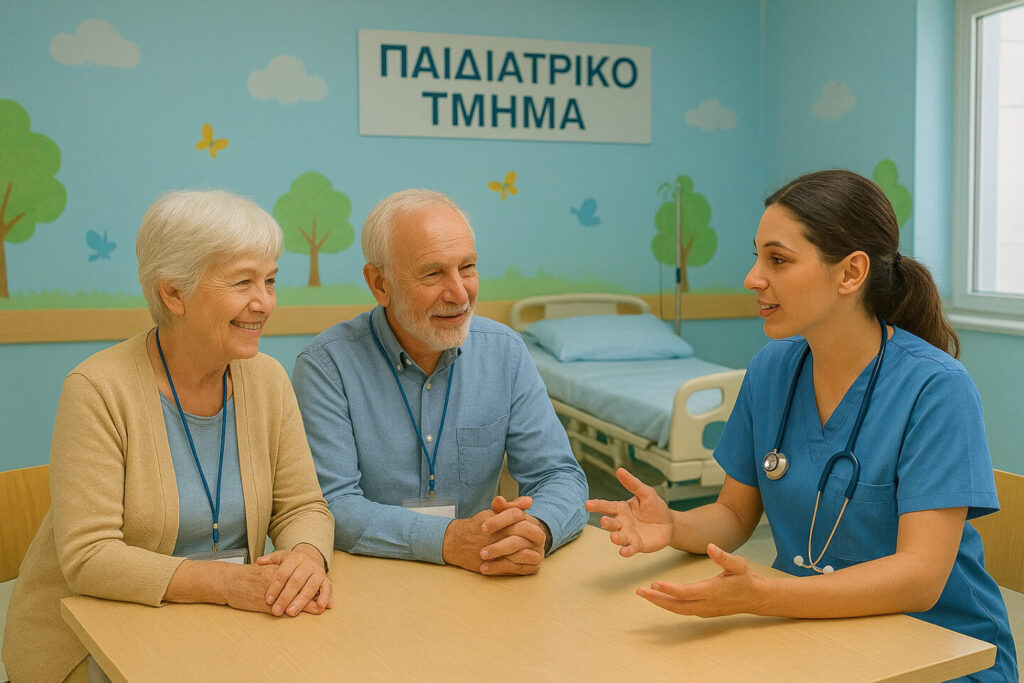
Think Piece Author: Dr Isidora D. Mytilinaiou, Social Researcher
Introduction:
Volunteering stands as the foundation of civil society, especially in challenging times marked by evolving social norms, increasing healthcare demands, and demographic shifts. ‘Strengthening Civil Society in Challenging Times’, IVCO’s 2025 topic, encourages reflection on how volunteer programs might flourish in challenging environments. An up-to-date example is the creation of a 65+ Volunteer Registry for Greek children’s hospitals. It tackles two interrelated issues: how to properly incorporate older adult volunteers into delicate child care settings and how to handle the relational dynamics and emotional labour these positions need.
This think piece examines how hospitals and elderly volunteers can negotiate roles, expectations, and support in emotionally charged environments by drawing on theories of emotional labour and psychological contract. The objective is to demonstrate how research-informed design may support the development of volunteer programs that are genuinely inclusive of the needs and abilities of older persons, relationally aware, and emotionally sustainable.
Theoretical foundations: two complementary lenses
Psychological contract theory concerns the unwritten, often tacit promises volunteers perceive between themselves and organisations. Unlike formal contracts, these ‘psychological contracts’ govern expectations about roles, support, recognition, and reciprocity. When organisations fail to meet these expectations — for instance, by providing unclear roles or insufficient support — volunteers experience ‘contract breach’, leading to dissatisfaction or withdrawal. In volunteering, this dynamic is crucial because motivations are often intrinsic and relational rather than transactional. Clear mutual expectations help prevent misunderstandings and build trust.
Emotional labour theory addresses the effort volunteers expend managing their emotions and outward expressions to meet organisational ‘feeling rules’. In children’s hospitals, this labour is intense: volunteers provide comfort to sick children and families, maintain calm amid distress, and suppress personal discomfort. Emotional labour is demanding and, if unsupported, can lead to stress or compassion fatigue. Unlike paid healthcare workers, volunteers rarely receive structured emotional training or supervision — yet the expectations placed on them are comparable. Recognising and supporting this emotional work is vital for sustaining volunteer engagement and wellbeing.
Translating theory into practice: Designing the 65+ Volunteer Registry
Conclusion
Volunteering in children’s hospitals is a form of managing compassion—a delicate, demanding, and vital relational labour. Designing the 65+ Volunteer Registry with psychological contract and emotional labour theories at its core provides a blueprint for building programmes that are both compassionate and sustainable. Rather than ‘bureaucratising kindness’, this approach makes the invisible visible: it names expectations, recognises emotional work, and builds supports that allow volunteers and hospitals alike to flourish.
In doing so, the registry strengthens civil society by honouring the generosity of older volunteers and helping healthcare institutions harness that generosity without exhaustion or disenchantment. It embodies Forum’s vision of volunteerism as a resilient, relational infrastructure for challenging times.

Forum is a global network of organisations working through volunteers to achieve sustainable development
Global Volunteering Forum
©2025 IVCO. All rights reserved. Web Design by Britt Novakowski